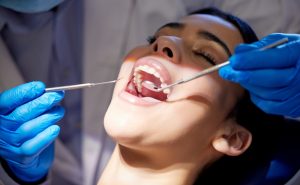Caring for a loved one who has difficulty with daily activities can be a full-time endeavor, even under the best of circumstances. Part of caring for someone’s daily needs includes having the right oral hygiene in place.
Read our complete guide to helping you care for a loved one’s teeth as part of a regular oral health routine.
Why is oral hygiene important for your loved one?
Good oral hygiene can help your loved one chew better, avoid mouth pain, avoid tooth loss, eat well, and enjoy their food. Not brushing teeth and not flossing can lead to plaque build-up on teeth. Not brushing teeth well enough can also lead to problems, so it’s important that your loved one’s caregiver brush and floss their charge’s teeth properly for best results.
What level of oral care will my loved one require from me?
It depends on your loved one’s abilities to perform daily tasks. Someone with cognitive decline may simply need to be reminded to brush their teeth every day. Someone recovering from a stroke may require someone to brush and floss their teeth for them based on how they are able to move their arms and hands. Mobility issues such as arthritis may also make it difficult to brush and floss.
How do I care for my loved one’s teeth if they can brush and floss on their own?
Your loved one can still benefit from your caregiving support even if they can still maintain good oral hygiene on a daily basis.
- It all starts with good communication. Ask your loved one about their daily oral hygiene routine and see what they say.
- If you can, check on what oral hygiene tools they have in their bathroom. Look for a toothbrush, toothpaste, mouthwash, and dental floss or floss picks. If you notice any of the things look old or if the toothpaste is expired, replace them with new items. For people with arthritis in their hands, consider purchasing an automatic toothbrush for them. Make sure the toothpaste and mouthwash have fluoride in them for best results.
- Talk to your loved one about the importance of maintaining an oral hygiene routine.
- Help your loved one set up a daily oral hygiene schedule, either with written reminders around the house or using technological tools on a smartphone.
- We recommend everyone brush their teeth for two minutes for the best results. Use a two-minute countdown timer to remind your loved one how long they should brush their teeth.
- Offer to make appointments to the dentist for your loved one or go to the dentist with them. If your loved one goes to the appointment on their own, ask them what the dentist said to do and incorporate those instructions into the oral hygiene routine.
How do I care for my loved one’s teeth if they require physical assistance?
Being a full-time caregiver for a loved one can be stressful, even if you know the person very well. The key is to practice patience and compassion. Treat your loved one how you would want to be treated if the roles were reversed.
We recommend soft-bristled toothbrushes and floss picks or water flossers to make your tasks easier. Be as efficient as possible when taking care of someone else’s teeth. Once you develop a routine, it will get easier.
Prepare the work area before you begin. It doesn’t have to be in a bathroom where it can get crowded. Consider setting up a small station next to a couch or bed with plenty of water and cups in a place where everything is in easy reach. You’ll need cups with water for rinsing and then empty cups for spitting. Think about disposable cups for this task if you’re not brushing your loved one’s teeth in a bathroom or over the kitchen sink. The key is to make this as pleasant and comfortable as possible to prevent irritation and frustration.
Have your loved one sit up as straight as possible. Drape a towel over their clothing to prevent it from getting wet. It might be easier to have your loved one sit in front of a mirror so you can work from behind or to the side.
Wear gloves to prevent the spread of germs. If you or your loved one is at risk for infectious diseases like COVID-19, influenza, or the common cold, you should wear a mask to reduce the spread of viruses.
Use the Tell-Show-Do approach for your loved one. Tell the person how you’re going to help them and what you’re going to do, such as “I’m going to brush your teeth by using this toothbrush and moving around gently in your mouth.” Show what you’re going to do before you do it. Hold the toothbrush in front of them and make a brushing motion with it to describe what’s going to happen. Then do what you said you are going to do in the same way you explain it to them.
Dip the toothbrush in water to moisten it. Place a pea-sized amount of fluoride toothpaste on it. Gently hold your loved one’s chin and pull it down to open their mouth. Begin brushing using a circular motion, getting every surface of each tooth as much as you can.
If the person cannot spit out the toothpaste, water, or mouthwash, use a clean soft cloth or sterile gauze pad to wipe their mouth completely. When rinsing, you can dampen a clean cloth or gauze pad to make sure you rinse off as much toothpaste as you can.
Make this process fun! Talk to your loved one about their day, tell jokes, play their favorite music, and discuss what’s important to them as you brush their teeth.
Who can help me with some oral hygiene tips for helping my loved one?
The dentists and oral hygienists at Parkcrest Dental Group can help you by providing practical tips as a caregiver for your loved one. Feel free to reach out to us at any time during office hours by calling (417) 887-1120. We’re happy to assist!





